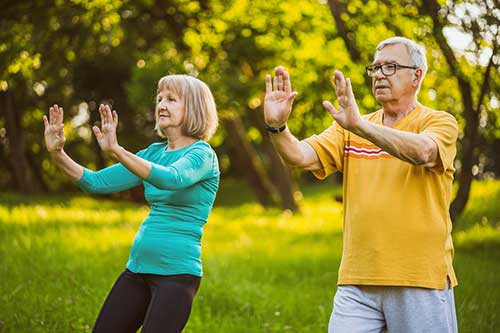Balancing the Brain & Body: The Benefits of Tai Chi

As we age, one of the diseases we fear the most is dementia. Thankfully, promising new research shows proven methods of preventing and possibly even reversing this condition.
Dementia describes a variety of symptoms including memory loss, but it can also affect language and motor skills, intellectual functions, and our ability to make sound judgements. The most common form is Alzheimer's disease, which destroys brain cells, resulting in impaired and deteriorating memory with the loss of cognitive functions.
Based on my integrated lifestyle approach to achieving optimum health and wellness, I’ve outlined eleven steps that are designed to help improve cognition and reduce the risk of dementia:
(1) Regular Exercise, (2) Healthy Diet, (3) Dietary Supplements, (4) Mental Stimulation, (5) Engaging in Creative Endeavors, (6) Quality and Quantity of Sleep, (7) Good Oral Health, (8) Social Engagement, (9) Stress Management, (10) Avoiding Prescription Drugs that Increase the Risk of Dementia and (11) Avoiding Health Hazards.
Exercise and Balance: Choosing the Right Workout Can Fine Tune Your Brain
Regular exercise is recommended to ensure we don’t lose lean muscle as we age (sarcopenia), and it helps make sure we can perform the basic physical activities of daily life. New research is showing that exercise can also make us smarter.
Walking Fast & A Healthy Gait
Many years ago I visited a restaurant and when the waiter came to my table, I asked him how long he had worked there. He told me he was actually the manager, but as he was short-staffed he was waiting tables that day. I asked him what qualities he looked for when hiring, and he said that one of the most important factors is that they walk fast. I had never given this much thought, but it’s not just limited to ‘hustle’ - there is a connection between cognitive performance and gait. Slow walking speed and gait dysfunction (where someone shuffles or is unsteady) are highly associated with dementia. Research at Newcastle University found that those with dementia (including Alzheimer's disease or Lewy body dementia) have unique walking patterns that can even help determine which condition a person has. In addition, decreases in gait velocity (how fast you walk), and the ability to multitask while walking can predict mild cognitive impairment and dementia.
I had always considered myself a fast walker, but about four years ago my walking speed was severely affected after tearing the cartilage in both knees while exercising. The results of an MRI indicated that my knees were beyond the point where physical therapy could help and that I should get both knees replaced. I was dependent on a walker and cane due to the pain and it was almost impossible to go up or down stairs. In researching possible solutions, I learned about kybun therapeutic footwear which was recommended as a treatment that might help reduce the pain I was enduring when walking. After reading dozens of testimonials from people with similar problems who found that kybun footwear worked for their pain issues, I purchased a pair.
After less than two weeks, the pain was so much better that I could walk without the walker or cane. I told a prominent physiotherapist about my improvement and how the shoes had lessened my pain and enabled me to walk without support so quickly. He was anxious to see them because he had patients with similar problems, and was intrigued that a shoe could facilitate such a rapid change. When he visited soon after, he started by asking me to walk to analyze my gait. He said to me "Nathan, you're not walking correctly. Didn't anyone ever teach you how to walk properly?"
Surprised by his statement, I said "I guess not. Can you help me?" The physiotherapist illustrated that I should press down on the heel with the front of the foot raised (dorsiflexion), and then push off with the toe (plantar flexion). He recommended that I practice walking in a straight line each day until I had relearned how to walk. My knee pain gradually lessened, and after about six months I was pain-free.

After my miraculous improvement, I contacted kybun (located in Switzerland) and started offering their therapeutic footwear at Aviva. I believe that everyone can benefit from this incredible technology that can reduce knee, back, and hip pain, and help rebuild knee cartilage with regular use.
A couple of years later I shared my story with a tai chi instructor and told him what the physiotherapist had taught me about walking properly. After showing him how I was told to walk, he told me "That's tai chi walking."
Gait & Balance: Tai Chi & Qigong
I learned that it was not only gait but also balance that is associated with the risk of developing dementia, with many studies showing the relationship between cognitive decline and difficulty walking. One of the best methods of improving balance is learning tai chi. A form of martial arts often described as "meditation in motion," tai chi combines a variety of gentle movements with deep controlled breaths. I asked the tai chi instructor (Marshall Garland from Therapeutic Qigong) if he would consider teaching me, and now, two years later, I can do all 24 movements in the Yang style, though I continue to take lessons to refine my technique. A low impact activity that puts minimal stress on muscles and joints, research has found that tai chi can help prevent and rehabilitate many conditions commonly associated with aging.
One of the tai chi movements is Jin Ji Du Li (Golden Rooster Stands on One Leg), where you stand on one leg in perfect balance. Traditional Chinese medicine practitioners believe daily practice can help improve mental function and quality of sleep by synchronizing internal organs and restoring body balance. Falls, often associated with a lack of balance, resulted in over 25,000 deaths in people over 75 in the US in 2016.
Tai chi is recommended for circulatory issues, joint pain, enhancing the immune system, neck and back problems, diabetes, high blood pressure, headaches, tinnitus, vertigo, and gout. Tai chi can help reduce stress while improving balance and mood, making it an important exercise for anyone who strives to live a healthier lifestyle.

Qigong is another popular Chinese exercise that is in some ways like tai chi. One particular qigong exercise is Baduanjin (Eight Pieces of Brocade). One of the oldest qigong exercises with over 1000 years of history, a 2014 study found that regular Baduanjin exercise led to improvements in psychological health including reduced pain, depression and anxiety, with better sleep duration and quality.
By combining the proper walking technique (enhanced by kybun footwear) with the gentle exercise provided by tai chi and qigong, we can boost mental acuity, improve balance, and enhance our overall quality of life.
Health Disclaimer. Copyright ©2021. Nathan Zassman is a trained nutrition practitioner and the owner of Aviva Natural Health Solutions.
Also see:
Help Stop Those Senior Moments Before They Start
Brain Food – Dietary Principles to Help Prevent Dementia and Alzheimer’s Disease
Brain Food: Help Reduce Inflammation and Boost Brain Function
The Brain Benefits of Superfoods and Stomach Acid
Supporting Science
Cognitive Contributions to Gait and Falls: Evidence and Implications.
Mov Disord. 2013 Sep 15; 28(11): 1520–1533. PMCID: PMC4119872
The Effect of Chinese Traditional Exercise-Baduanjin on Physical and Psychological Well-Being of College Students: A Randomized Controlled Trial.
PLoS One. 2015; 10(7): e0130544. PMCID: PMC4497728
